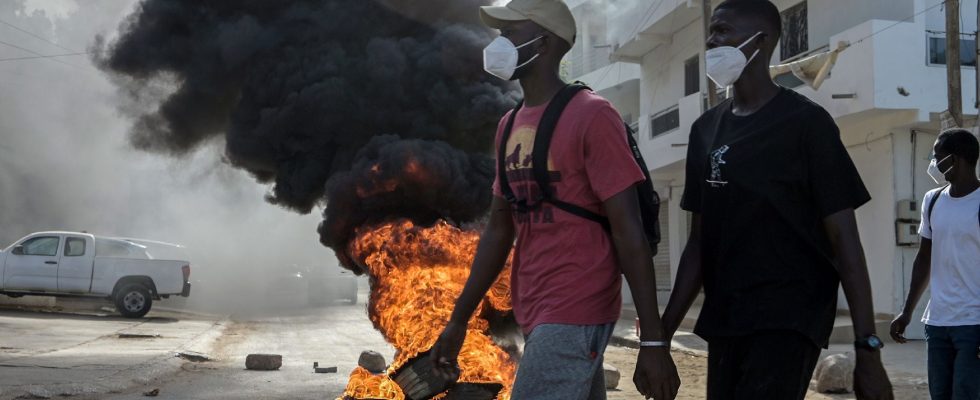The meeting was set for 3 p.m. this Tuesday, February 13, at the Jet d’Eau roundabout, in the heart of Dakar. At the call of representatives of civil society (academics, imams, unions, etc.), a large “silent and peaceful” march was to be held, to protest against the postponement of the presidential election from February to December, announced by the president Macky Sall. It will not take place. Because early in the morning, the authorities banned it. In the process, the mobile Internet signal was also cut, for the second time in 10 days, to stem the protests.
To symbolize this censorship, the members of the civil society collective at the initiative of this aborted mobilization, Arr Sunu Elections (Editor’s note, “Let’s protect our election”, in Wolof) therefore decided to appear a red gag around their neck and hands tied during a press conference on Tuesday. “Our freedoms are gagged, they denounce. And all the strategies which aim to postpone the presidential election for ten months seek to take away the sovereignty of the Senegalese people”. Before adding that the organization of a march in the streets of Dakar does not require authorization, but a simple declaration. In fact, Dakar remained peaceful on Tuesday, patrolled by dozens of armored gendarmerie vehicles and heavily equipped police forces.
“More and more violence”
Since the announcement of the postponement of the presidential election by Macky Sall, mobilizations have been systematically prohibited. And when they take place despite everything, they are repressed, dispersed by tear gas. This Friday, February 9, three young men, aged 16, 22 and 23, were shot dead. The NGO Human Rights Watch (UNHCR) also counts 60 injured, at least 271 people arrested, and journalists attacked. “It’s very worrying, the regime in place cares less and less about freedoms and is engaging in more and more violence,” laments Adjaratou Wakha Aidara, executive director of the NGO Partners of Africa. This shift into violence is not new. In March 2021 and June 2023, during the deadly demonstrations that the country experienced, the UNHCR had already documented “the excessive use of force by Senegalese security forces, including live ammunition and the abusive use of gas tear gas”, to disperse the demonstrators, and recorded at least 37 deaths.
Currently, the collective of families of political detainees estimates the number of opponents imprisoned since 2021 at 1,500, awaiting trial. “Today, in Senegal, if you go to demonstrate, you risk prison, if you make a Facebook post against the government, you risk prison, if you broadcast images of police violence, you risk prison,” denounced Souleymane Ndjim, member of the collective, during a press conference this Wednesday February 14, castigating an “authoritarian regime which does not speak its name”.
Self-censorship
And while Macky Sall and his government are in the process of proposing an amnesty bill concerning at least 500 of these prisoners, to, it is said, “ease tensions”, their families reject it outright. “The State has always refused to recognize the existence of political detainees, but these recent declarations prove that they did exist,” says Sayda Ndeye Diop, mother of a young man detained for eight months in Rebeuss, the Dakar central prison. “We refuse to allow them to be a political bargaining chip. Our children must be judged as quickly as possible because they are innocent,” she adds.
In addition to the activists, deputies and former ministers of the Republic were also arrested during the latest demonstrations. “They held me for hours at the gendarmerie, then released me without even questioning me,” Aminata Touré, former Prime Minister under Macky Sall and now a member of the opposition coalition, tells L’Express. “Senegal is in decline, we are experiencing dark times like we have never known before,” she laments.
Faced with this round of arrests, the threats suffered by journalists and the suspension of a television channel (WALF TV, for 8 days), certain analysts prefer to speak on condition of anonymity. “For several years, we have clearly noted a democratic regression against a backdrop of political crisis, which can also be described as ‘authoritarian drift'”, confides a researcher specializing in security issues. “It is difficult to maintain this posture in a public and open way, without getting slapped on the wrist. This could have consequences for the organization with which I work,” he continues. In Senegal, a regime nevertheless hailed as the “democratic beacon” of West Africa, the signs of political hardening are increasingly convincing. A new large-scale mobilization is expected on Saturday. “Whether it is authorized by the authorities or not,” warned the organizers.
.
